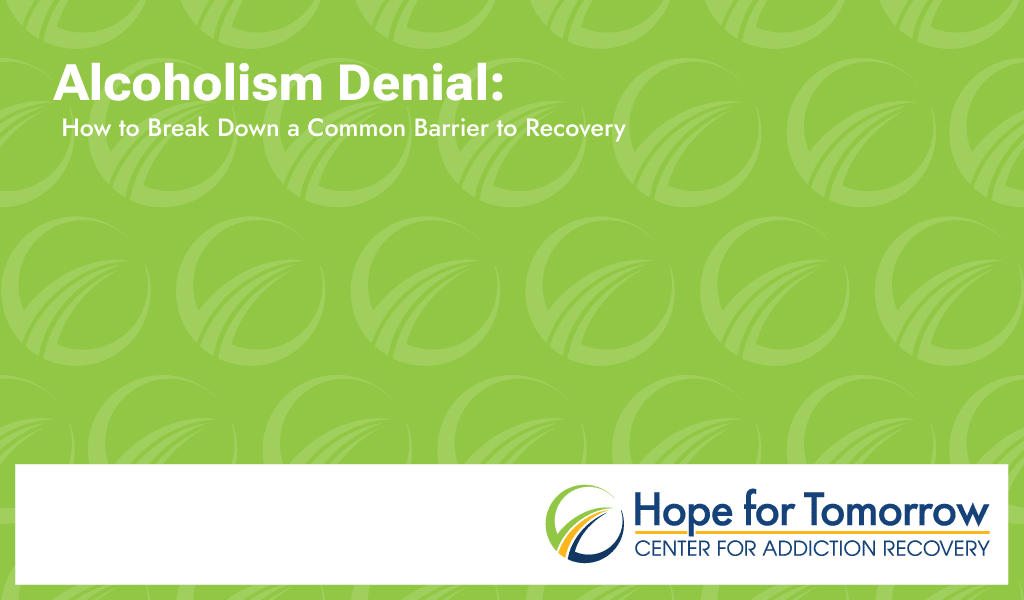

8% of West Virginians had an alcohol use disorder in 2021. In reality, that number is probably larger. That statistic requires people participating in a survey to identify as someone with an alcohol use disorder, and that’s not an easy admission to make.
Instead, many people with alcohol use disorders make excuses to justify how much they drink, and why they can continue without getting help. “I can stop drinking at any time.” “It’s not actually that much.” “I’m just drinking to have fun and unwind.” Do those statements sound familiar?
Our patients at Hope for Tomorrow talk about their experiences with alcoholism denial frequently, and it can be a serious barrier to individuals seeking the care they need and achieving recovery.
It might seem obvious to you that your loved one’s drinking habits are destructive, but there are a lot of reasons why they can’t acknowledge it themselves. Let’s discuss alcoholism denial, and what you can do to help your loved one confront their alcohol use disorder and start their journey to recovery.
While denial isn’t an official symptom in the DSM-5 that is used to diagnose alcohol use disorder, it is common in people whose drinking habits have developed into an addiction. No one wants to admit they have a problem. In the case of alcohol use disorder, people rely on alcohol to cope with something else going on in their lives. It provides them with relief. The last thing they want to do is risk losing that relief, even if they know it’s harmful deep down. Some people with alcohol use disorder refuse to admit the damage their drinking is causing even to themselves, continuing to tell themselves that it’s fine so they can preserve their destructive coping mechanism.
The presence of denial about the extent of their drinking can be a sign that your loved one has an alcohol use disorder in itself. These behaviors are signs of denial:

Each person will have unique motivations for denying their alcohol use disorder, but there are several common reasons. These include:
“Secondary denial” is the denial of loved ones of someone with an alcohol use disorder experience sometimes. This is noticing your loved one’s drinking habits and thinking, “It’s not that bad,” or “It isn’t a problem.”
The problem with secondary denial is that it can indirectly prevent people with alcohol use disorder from getting help. Loved ones in denial over someone’s harmful drinking habits might have a tendency to protect the person from the consequences of their behavior.
Once you go through the hard process of accepting your loved one has an unhealthy relationship with alcohol, you’re in a better place to help them. It’s more difficult to justify making excuses for them, and easier to look into treatment and try to point them in the right direction.
It’s important to remember that in the end, you can’t force someone to think a certain way. The person with the alcohol use disorder has to come to terms with the reality of the situation and seek help for themselves. You can still be a valuable source of support on their road to recovery, though.
The most important thing is to approach every conversation with your loved one with empathy. Watching someone sacrifice so much for alcohol can be frustrating, especially if they don’t seem to acknowledge the damage it’s having on their life, but anger and accusations aren’t helpful. Instead, calmly express that you care for them and are concerned about their health. Try to put yourself in their shoes, even if it’s difficult. Your loved one is likely in a lot of pain and feeling a lot of conflict, even if they can’t admit they have an alcohol use disorder yet. That’s a hard position to be in – even more so when you consider how cruelly our society treats people with substance use disorders.
Asking questions about the person’s drinking can be helpful, and lead them to reflect. Try to remain as outwardly neutral as possible. “Do you think alcohol is having an impact on your job?” “How do you feel after drinking last night?” and “Do you think that situation would’ve gone differently if you weren’t drinking?” are examples of questions that might be appropriate. Don’t take charge of the situation. Let your loved one answer, and actively listen to what they have to say.
You can also introduce your loved one to treatment options. Do some research and look into different alcohol use disorder programs in your area, and bring it up to them. Be sure to highlight anything you think they might find exciting, like fun amenities or conveniences that will make treatment feel like something positive, and not a punishment.
Don’t forget to take care of yourself, too. Even if you don’t have the condition yourself, you are also living with an alcohol use disorder, and it isn’t easy. Don’t be afraid to contact a therapist or other mental health professional for additional support. Rest assured, you have plenty of reason to get help, too, and you don’t have to manage these complicated feelings alone.

The good news is, treatment for alcoholism (alcohol use disorder) is available for your loved one. It may take time for them to accept they need it. Patience is key. Sometimes, it’s the consequences of their actions that make someone with an alcohol use disorder see reason and seek help. Other times, it’s the determination of someone like you expressing their concern and desire for them to get treatment that is the final push they need. Any reason to go into treatment is a good one, and everyone is worthy of recovery. Alcohol rehab will be here whenever your loved one is ready.
Hope for Tomorrow, located in Point Pleasant, WV, is dedicated to providing compassionate addiction recovery services to everyone in need. We take special care to include populations other facilities may leave behind, like veterans, couples seeking treatment together, people with additional health conditions, and pregnant women. No matter who they are, where they are in life, or where they come from – your loved one is welcome here. We hope you’ll call us at 877-679-8162 for more on what we can do to help.
Treatment today for a brighter tomorrow.